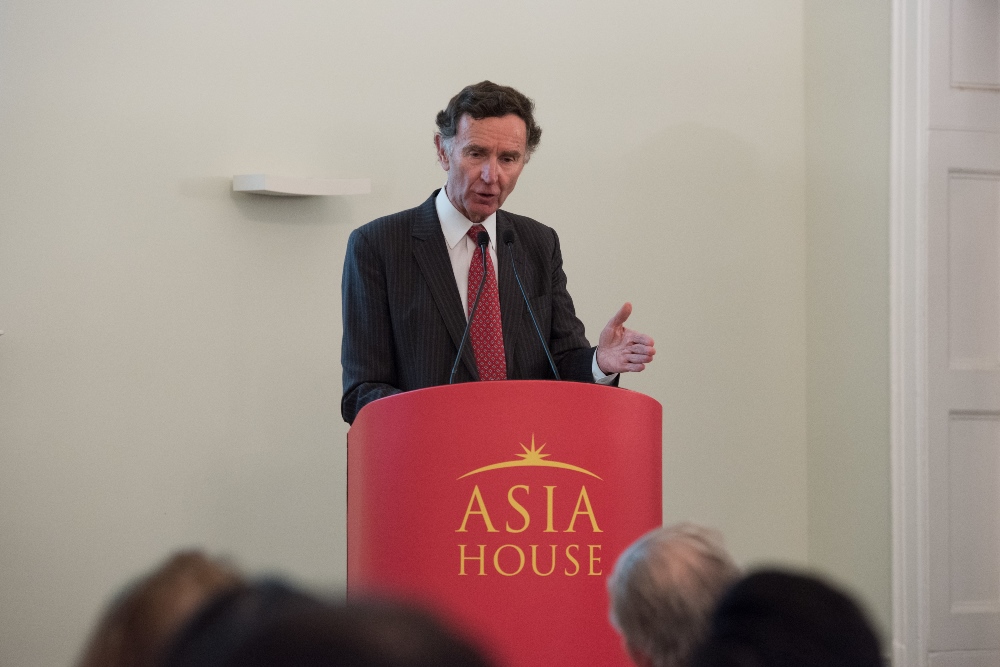Driving commercial and political engagement between Asia, the Middle East and Europe
Driving commercial and political engagement between Asia, the Middle East and Europe
Driving commercial and political engagement between Asia, the Middle East and Europe

The great powers of the next century will be focused in Eurasia, with China being a dominant force, Lord Green, Chairman of Asia House, predicted last night in the inaugural Asia House Annual Lecture.
Lord Green’s lecture, ‘China and the New Global Order – Taking the Long View,’ considered China’s remarkable rise in a wider context, drawing on its domestic and international ambitions and the broader geopolitical landscape.
In a fascinating talk spanning three centuries, Lord Green explored how history can inform our predictions for the future, and stressed the importance of taking a long-term, strategic view of China’s rise.
“Taking the long view is something China does,” Lord Green said.
Discussing China today, Lord Green highlighted the new aspects emerging in domestic and international policies, including “a renewed emphasis that the Chinese economy needs to rebalance itself,” and support for “more connectivity in both directions.”
China’s President Xi’s speeches at the UN and Davos last year reflect a new approach to Chinese international relations, Lord Green added.
“This is not just rhetoric, nor a detailed blueprint. It’s a manifesto, something of a statement of intent.”
Lord Green also discussed the Belt and Road Initiative – a programme “that gets more ambitious as time goes by,” he said, citing recent talk of extending the Initiative to the Arctic.
Marshalling historic evidence to good effect, Lord Green outlined his predictions on how the global order will shift to accommodate China’s rise, and how the new emerging powers will operate within the new architecture.
Looking back to the 19th century, he identified the six great powers that dominated the global economy and occasionally convened as the “concert of powers.” Against the backdrop of tremendous technological and infrastructure development, notably the railways such as the Trans-Siberian Railway, the concert of powers helped establish the first model of globalisation.
However, the 20th century “broke up empires” and “markets were disconnected,” Lord Green argued. “Globalisation was brought to a halt.” The emergence of the US shifted the global order once more, with America’s rise being the “driver and sponsor of the post war international order.”
Now, that order is changing again. “A new concert of powers is emerging,” Lord Green said.
But they won’t be in Europe.
“Europe is in no mood to exert itself on the world stage in any coherent manner,” Lord Green said, adding that the continent is “rolling back” to its 1500s outlook. Instead, the future powers will be almost exclusively in Eurasia.
“Eurasia makes up 30 per cent of the world’s landmass, 70 per cent of the population,” he said, identifying China, India, Japan, Russia, Turkey and Iran as likely to dominate the upcoming centuries. The exception is the US, which “you should never short for very long,” Lord Green advised.
Concluding, Lord Green discussed the opportunities and threats that will likely emerge as the new global order takes shape.
“The world trade opportunities are hugely significant,” he said, highlighting the Belt and Road Initiative as an example. “There are sceptics of course, and this $US1 trillion is yet to materialise. But it is nonsense to suppose there is no economic case to be made for a major infrastructure programme.”
Yet there are risks too. Rising nationalism in China, India and Turkey are causes of concern, while the shifting global order will place strain on the current, post war global trade institutions. But Lord Green struck a positive note with which to conclude the lecture.
“I think the future is bright, but we need to be careful,” he said.
